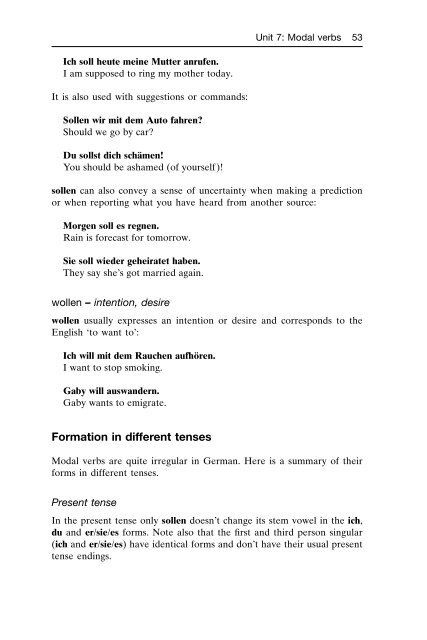Intermediate german
You also want an ePaper? Increase the reach of your titles
YUMPU automatically turns print PDFs into web optimized ePapers that Google loves.
Unit 7: Modal verbs 53<br />
111<br />
2<br />
3<br />
4<br />
5<br />
6<br />
7<br />
8<br />
9<br />
1011<br />
1<br />
2<br />
13<br />
4111<br />
5<br />
6<br />
7<br />
8<br />
9<br />
2011<br />
1<br />
2<br />
3<br />
4<br />
5<br />
6<br />
7<br />
8<br />
9<br />
3011<br />
1<br />
2<br />
3<br />
4<br />
5<br />
6<br />
7<br />
8<br />
9<br />
4011<br />
1<br />
2<br />
3<br />
41111<br />
Ich soll heute meine Mutter anrufen.<br />
I am supposed to ring my mother today.<br />
It is also used with suggestions or commands:<br />
Sollen wir mit dem Auto fahren?<br />
Should we go by car?<br />
Du sollst dich schämen!<br />
You should be ashamed (of yourself)!<br />
sollen can also convey a sense of uncertainty when making a prediction<br />
or when reporting what you have heard from another source:<br />
Morgen soll es regnen.<br />
Rain is forecast for tomorrow.<br />
Sie soll wieder geheiratet haben.<br />
They say she’s got married again.<br />
wollen – intention, desire<br />
wollen usually expresses an intention or desire and corresponds to the<br />
English ‘to want to’:<br />
Ich will mit dem Rauchen aufhören.<br />
I want to stop smoking.<br />
Gaby will auswandern.<br />
Gaby wants to emigrate.<br />
Formation in different tenses<br />
Modal verbs are quite irregular in German. Here is a summary of their<br />
forms in different tenses.<br />
Present tense<br />
In the present tense only sollen doesn’t change its stem vowel in the ich,<br />
du and er/sie/es forms. Note also that the first and third person singular<br />
(ich and er/sie/es) have identical forms and don’t have their usual present<br />
tense endings.



